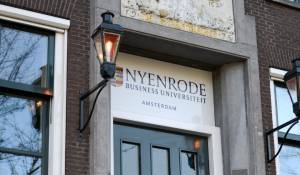I'm sure you will appreciate that nobody can give you an unbiased comparison between MBA programmes because participants' experiences are probably more valuable than statisticians' (especially since the things measured in the rankings are pretty poor proxies for course quality) and it would take a (wealthy) masochist to put themselves through more than one MBA course in a lifetime. So I can only tell you what I like about Cranfield, plus some observations about your alternatives based on desk research and attending open evenings.
There are three areas in which I think Cranfield successfully differentiates itself from other business schools:
1. Greater emphasis on the interpersonal side of business - how organisations and individuals (including ourselves) interact, and also what we want from our work lives. There's no point in being able to come up with a great strategy if you can't get people to buy into it, or in valuing a business well but being unable to buy it for your company because you're not a great negotiator; more important still, gaining an MBA qualification is a ticket to a wide range of career and life options; I think Cranfield does more to help students think about how best to use that privilege
2. A significant proportion of Cranfield faculty members have worked at a relatively high level in the business world, and still do consultancy projects for commercial clients. And the school provides a lot of customised executive education, much of it delivered on client premises, for a wide range of corporates and public bodies. So the lecturers have a much closer connection with real business contexts than those in some other establishments
3. The school's admissions policy favours older, more experienced students (especially on the Exec programme) and recruits them from a much wider range of backgrounds than most, if not all, business schools. There are some (LBS?) that seem to favour people from the City/investment banking and from the big accounting and consulting firms, while others seem to attract Indian IT guys. It's great to have some people from these backgrounds in a cohort, but when people of one profile start to crowd out others, the range of experiences and perspectives shared during lectures can be diminished.
Of the three points I've highlighted, the third is the one that made the biggest impact on me. The range of people on my course made for a unique experience - they ranged in age from late 20s to mid 50s, included people who left school at 16 and others who already had PhDs and Masters degrees, and featured a guy who taught special forces to resist torture techniques, serial entrepreneurs and a woman who ran a centre that helped young women who'd been abused.
Much of what you learn on whichever MBA programme you choose will not be about trade skills such as discounted cash flows, value stream maps, directional policy matrices and the like, but will be a combination of interpersonal and organisational stuff and the learned experiences in real business contexts gained by your peers and the lecturers. Using those criteria I think Cranfield is hard to beat. But, of course, I haven't studied at any other of the schools you mention, and people who've attended those might see the same strengths in those establishments as I do in Cranfield...
Finally, you said that the best international experience is important to you. Most good business schools attract students from many countries (which is a different matter than having a high proportion of overseas students, many of whom could all be from one country). I nearly went to LBS. Its intake probably includes people from as many countries as Cranfield's. However, I noticed that many of them seemed to work for investment banks or PWC. That doesn't represent diversity of experience to me.
I'm sure you will appreciate that nobody can give you an unbiased comparison between MBA programmes because participants' experiences are probably more valuable than statisticians' (especially since the things measured in the rankings are pretty poor proxies for course quality) and it would take a (wealthy) masochist to put themselves through more than one MBA course in a lifetime. So I can only tell you what I like about Cranfield, plus some observations about your alternatives based on desk research and attending open evenings.
There are three areas in which I think Cranfield successfully differentiates itself from other business schools:
1. Greater emphasis on the interpersonal side of business - how organisations and individuals (including ourselves) interact, and also what we want from our work lives. There's no point in being able to come up with a great strategy if you can't get people to buy into it, or in valuing a business well but being unable to buy it for your company because you're not a great negotiator; more important still, gaining an MBA qualification is a ticket to a wide range of career and life options; I think Cranfield does more to help students think about how best to use that privilege
2. A significant proportion of Cranfield faculty members have worked at a relatively high level in the business world, and still do consultancy projects for commercial clients. And the school provides a lot of customised executive education, much of it delivered on client premises, for a wide range of corporates and public bodies. So the lecturers have a much closer connection with real business contexts than those in some other establishments
3. The school's admissions policy favours older, more experienced students (especially on the Exec programme) and recruits them from a much wider range of backgrounds than most, if not all, business schools. There are some (LBS?) that seem to favour people from the City/investment banking and from the big accounting and consulting firms, while others seem to attract Indian IT guys. It's great to have some people from these backgrounds in a cohort, but when people of one profile start to crowd out others, the range of experiences and perspectives shared during lectures can be diminished.
Of the three points I've highlighted, the third is the one that made the biggest impact on me. The range of people on my course made for a unique experience - they ranged in age from late 20s to mid 50s, included people who left school at 16 and others who already had PhDs and Masters degrees, and featured a guy who taught special forces to resist torture techniques, serial entrepreneurs and a woman who ran a centre that helped young women who'd been abused.
Much of what you learn on whichever MBA programme you choose will not be about trade skills such as discounted cash flows, value stream maps, directional policy matrices and the like, but will be a combination of interpersonal and organisational stuff and the learned experiences in real business contexts gained by your peers and the lecturers. Using those criteria I think Cranfield is hard to beat. But, of course, I haven't studied at any other of the schools you mention, and people who've attended those might see the same strengths in those establishments as I do in Cranfield...
Finally, you said that the best international experience is important to you. Most good business schools attract students from many countries (which is a different matter than having a high proportion of overseas students, many of whom could all be from one country). I nearly went to LBS. Its intake probably includes people from as many countries as Cranfield's. However, I noticed that many of them seemed to work for investment banks or PWC. That doesn't represent diversity of experience to me.



